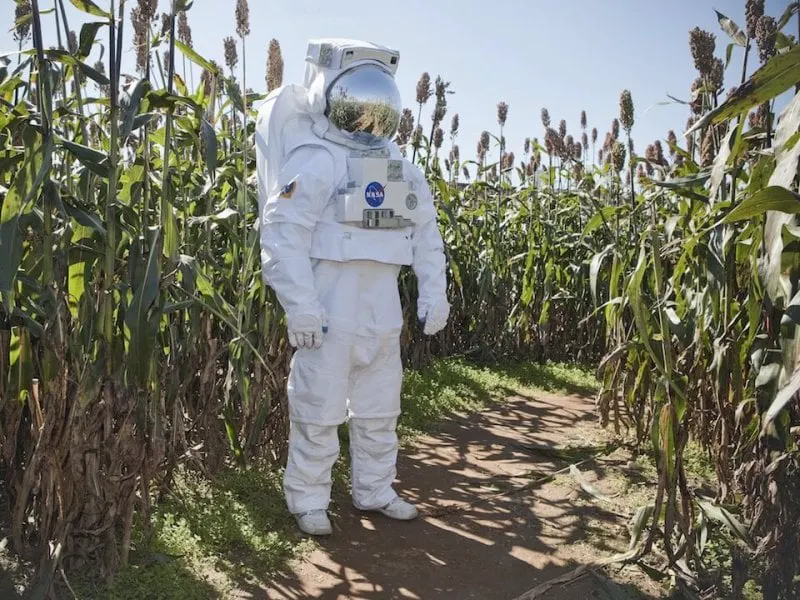Feeding astronauts on the Moon and Mars means sustaining plants and animals in space. Can science make it happen?
Feeding astronauts on the Moon and Mars means sustaining plants and animals in space. Can science make it happen?


Given that missions to the Moon, Mars, and beyond will not be able to rely on regular resupply missions, these habitats will also need to be as self-sufficient as possible. This means that water and air will need to be recycled and cleaned on an ongoing basis and that some food will need to be grown in-house.
This could be problematic, since space is a very harsh environment for all living things. And beyond the usual hazards, there’s a lot that we don’t know about food-production in space. But with a new era of human space exploration on the horizon, we are determined to find out!
[NASA’s Advanced Plant Habitat, or APA] system employs a series of LED lights and an environmentally controlled growth chamber equipped with over 180 sensors. This allows the APA to grow plants under optimal light conditions while relaying real-time information (temperature, oxygen content, carbon dioxide content, and water content of both plants and soil) back to the team at the KSC.
In 2019, the Israel-based company Aleph Farms (in collaboration with the Russian company 3D Bioprinting Solutions) grew the first meat in space. Using a process of bioprinting meat directly from bovine (cow) cells, the company produced a small quantity of beef aboard the ISS.
Looking to build on this success, the company announced a new program in late-October of 2020 to grow meat in space on an industrial scale.
Read the original post

 | Videos | More... |

Video: Nuclear energy will destroy us? Global warming is an existential threat? Chemicals are massacring bees? Donate to the Green Industrial Complex!
 | Bees & Pollinators | More... |

GLP podcast: Science journalism is a mess. Here’s how to fix it

Mosquito massacre: Can we safely tackle malaria with a CRISPR gene drive?

Are we facing an ‘Insect Apocalypse’ caused by ‘intensive, industrial’ farming and agricultural chemicals? The media say yes; Science says ‘no’
 | Infographics | More... |

Infographic: Global regulatory and health research agencies on whether glyphosate causes cancer
 | GMO FAQs | More... |

Why is there controversy over GMO foods but not GMO drugs?

How are GMOs labeled around the world?

How does genetic engineering differ from conventional breeding?
 | GLP Profiles | More... |

Alex Jones: Right-wing conspiracy theorist stokes fear of GMOs, pesticides to sell ‘health supplements’




 Trust issues: What happens when therapists use ChatGPT?
Trust issues: What happens when therapists use ChatGPT? Fighting deforestation with CO2: Biotechnology breakthrough creates sustainable palm oil alternative for cosmetics
Fighting deforestation with CO2: Biotechnology breakthrough creates sustainable palm oil alternative for cosmetics California, Washington, Oregon forge immunization alliance to safeguard vaccine access against federal undermining
California, Washington, Oregon forge immunization alliance to safeguard vaccine access against federal undermining Viewpoint — Fact checking MAHA mythmakers: How wellness influencers and RFK, Jr. undermine American science and health
Viewpoint — Fact checking MAHA mythmakers: How wellness influencers and RFK, Jr. undermine American science and health 30-year-old tomato line shows genetic resistance to devastating virus
30-year-old tomato line shows genetic resistance to devastating virus Viewpoint: Video — Big Solar is gobbling up productive agricultural land and hurting farmers yet providing little energy or sustainabilty gains
Viewpoint: Video — Big Solar is gobbling up productive agricultural land and hurting farmers yet providing little energy or sustainabilty gains The free-range chicken dilemma: Better for birds, but with substantial costs
The free-range chicken dilemma: Better for birds, but with substantial costs ‘You have to treat the brain first’: Rethinking chronic pain with Sanjay Gupta
‘You have to treat the brain first’: Rethinking chronic pain with Sanjay Gupta
